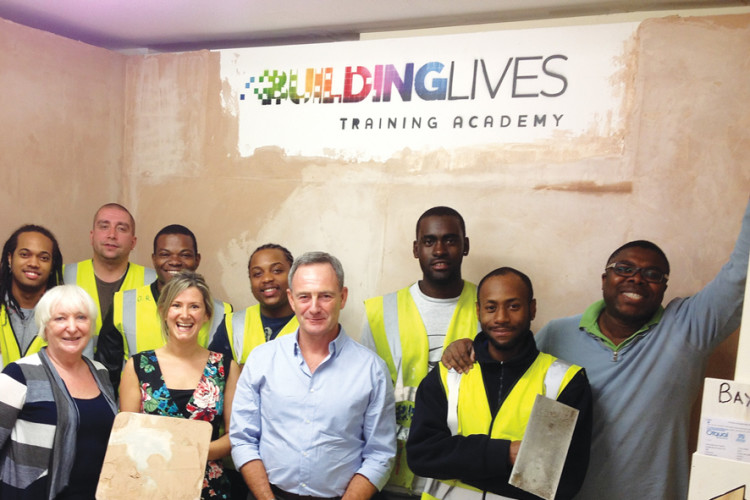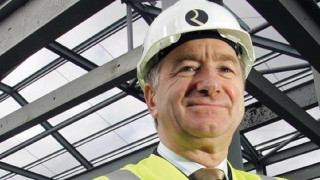One of the most entertaining business stories in the construction industry this year has been the battle for boardroom control at the housing maintenance contractor Lakehouse. Founder Steve Rawlings, better known in the pages of this magazine for his philanthropy and patronage of the Building Lives training foundation, evidently regretted stepping away from the business after its stock market flotation last year. He still owned more than 15.5% of the company and was more than a little concerned to watch the share price collapse from 86 pence to 33 pence within hours of the board issuing a profits warning on 1st February.
Together with second-biggest shareholder Slater Investments, Rawlings set in train a shareholder rebellion that by mid-April had got him back on the board. More than that, the chairman was ousted and replaced with a Rawlings nominee and a third Rawlings acolyte was also given a seat on the board. Stuart Black remains chief executive (at time of writing) but Rawlings is clearly back-seat driving.
All of which begs the question: why on earth would a sane man ever choose to float his company on the stock market anyway, leaving it exposed to the vagaries of irrational punters buying and selling bits of it according to their whim?
The truth is there are only two reasons why a sensible business owner would seek to list: either to get out of the business and buy a yacht to sail round the world; or to get finance to invest in expansion. While the first might result in a good time and a suntan, neither reason does the business any favours. In the first scenario the person who made the business what it is will no longer be around to run it; in the second scenario, they may think they are still in control but they no longer are. Instead they are at the mercy of City investors who know how to make a balance sheet appear attractive but don’t know their joists from their girders1.
The City requires listed companies to cut costs every year and simultaneously deliver increased profits. Private businesses, by contrast, can make rational decisions unencumbered by the expectations of outside shareholders, safe in the knowledge that all that matters is the Micawber Principle2.
Of course there are also bad reasons to float that can nevertheless prove irresistible to the business owner. Ego can be a powerful force in making a company successful, but it can drive a man (it’s usually a man) to want to see his name in the pages of the Financial Times. There can be confusion over the concepts of "better" and "bigger". Not everyone realises that it is better to have a nice medium-sized pie to eat at your leisure than to have a small piece of a giant pie that you have to wolf down immediately. Businesses that grow slowly and steadily, in their own good time, tend to remain sustainable. Those that go on the acquisition trail for rapid growth just to create an attractive balance sheet for investors tend to come unstuck. Lakehouse made five acquisitions in the nine months after its stock market debut.
The entire sorry saga of Balfour Beatty, which brought it near to collapse in 2015, can be explained by a succession of greedily-swallowed acquisitions that it is still trying to digest. And would Kier’s Paul Sheffield and Haydn Mursell have been so keen to spend nearly half a billion pounds on those lost-their-way crisis-cases Mouchel and May Gurney had it been their own money they were risking? Shareholders were hungry for growth and were quite happy to see it come from diversification away from construction and into facilities management and waste collection.
Capitalism, it almost seems, is bad news for construction.
Nick Hood, business risk adviser for Opus Business Services Group, says: “The problem is that construction is an under-skilled (in management terms), under-capitalised, cut-throatingly low-margin game where short termism and macho attitudes are usually dangerous, if not fatal. As a result, finance and funding is always problematical, although it is usually better where it is being arranged for owners with a genuine personal stake in the outcome.”
Of course, PLC status is not necessarily a one-way street to failure, just as there are many family-owned businesses that fail spectacularly too. But it is surely not a coincidence that Hood’s recent analysis for this magazine of contractors’ profitability put family-owned Robertson Group on top.
“Probably the most cogent reason why the family-owned, private ownership model is safer is because of the sheer difficulty of expressing in accounting terms what construction businesses do,” Hood says. “There is simply too much that is open to subjective interpretation, rather than objective calculation. Just ask any accountant or auditor about the valuation of contracts and the phasing of the recognition of profit for a long-term contract and you’ll get an eye-rolling, gurning response worthy of Mr Bean at his very best. In a quoted company, or one with venture capital (VC) owners to satisfy, management simply don’t have enough skin in the game to be trusted to stay honest, or if they do it’s pretty flaky and covered with a nasty rash of selfish over-optimism and personal ambition.”
Clearly now on a roll, Hood continues: “Risk management and risk awareness is another area where the difference between the business models is crucial. Privately owned companies are usually much more sensitive to their risk profile because it’s their wealth, their family’s jobs and their reputations both in the business and the local communities that will go up in smoke if they get it wrong. With all due respect, public company management or those answerable to VCs are playing with other people’s money and so often they’re just passing through en route to the next greener field. The rate of staff churn at the top and in the middle ranks of some of the quoted builders is frightening.”
Hood acknowledges that it can all go horribly wrong in a private construction business too: “Nepotism can put some very square pegs in round holes, dominant managing directors can stay past their sell-by date and there’s sometimes a dangerous blind spot about hiring the right talent from outside the family, especially in the finance department, or indeed keeping good outsiders if (as so often) they aren’t made to feel that they are genuinely a part of the decision-making team. But on balance, I know which type of contractor I’d rather trust with my money.”

Even though family-owned Laing O’Rourke reported a £58m loss for its European business last year, that was only down to heavy investment in its Design for Manufacture & Assembly programme. Ray O’Rourke has made a long-term decision about what is best for the future of the company and sees it in manufacturing and off-site construction. He does not think the future lies in making a big acquisition (unless, presumably, it will only cost him £1 like John Laing Construction did). And while many big contractors have sold their plant and tower cranes to improve their books, family-owned contractors like Laing O’Rourke and Sir Robert McAlpine have retained their own equipment fleets as part of the focus on their core business.
The day Ray O’Rourke announces an initial public offering is probably the day that the rest of the industry stops looking up to him.
That other titan of the British construction industry, Lord (Anthony) Bamford also has no intention of ceding ownership of his business, JCB, to anyone outside of the family.
Lord Bamford tells us that being able to ignore the City means he can give full attention to the things that really matter. “We’re a private, family-owned manufacturing company that doesn’t need to worry about what the Stock Exchange thinks about us. This means we can take a long-term view on the things that really matter: customers and products.
“We talk about products all the time. We talk about making sure that our product is the most efficient it can be for our customers. Every single day I, and many of our senior people, are meeting customers and we encourage customers from all around the world to visit our plants.”
This isn’t just a sales patter. Success is rooted in delivering what the customer wants. “We learn so much from our customers, often small things, but things which are very important to me because they are important to the customer,” Lord Bamford says. “Innovation is our lifeblood and the recent launches of the JCB Hydradig excavator and the 3CX Compact backhoe are prime examples of us responding to the needs of our customers through innovation.”
Caterpillar may argue this point. It has paid a cash dividend to its shareholders every year since the company was formed and has paid a quarterly dividend since 1933. Capitalism works fine for us, they’d surely say. But Cat’s current financial difficulties stem from what can only be deemed fiscal recklessness. Neither Lord Bamford nor Germany’s Liebherr family would ever have blown $8bn on Bucyrus International at the top of a boom in mining equipment sales. No, they would have invented a new machine of their own instead (and probably just in time for the next upswing).
Ultimately what it comes down to is that family firms are run by entrepreneurs and PLCs are run by managers. While this may imply that the PLCs are the more rational organisations, taking steps recommended by Henley, Harvard or Wharton business schools, entrepreneurs are hard wired to protect family interests rather than pack it in and take a new job somewhere else. Having their name above the door also gives them more cachet with the customer.
Compare the strategies chosen by family-owned Wates, Willmott Dixon and Sir Robert McAlpine with the publicly quoted Balfour Beatty, Interserve, Carillion or Kier. The latter have the bigger turnover but as they make acquisitions, pile on the debt and steer themselves into facilities-management and other new directions, it is the families that emerge as the more rational, the more cautious and the more conservative. Sure, you can’t choose your family; but you can’t choose your shareholders either.
One final point worth noting: you might want to buy shares in one of the top three management consultants in the world – Bain & Co, Boston Consulting Group or McKinsey & Co – since they are supposedly home to the world’s best business brains. But you can’t. They are too smart to allow themselves to be publicly listed.
Business is a private matter. Best keep it that way.
1. The answer, as everybody knows, is that Joyce wrote Ulysses and Goethe wrote Faust.
2. “Annual income twenty pounds, annual expenditure nineteen pounds nineteen and six, result happiness. Annual income twenty pounds, annual expenditure twenty pounds nought and six, result misery.” Mr Micawber, David Copperfield.
Got a story? Email news@theconstructionindex.co.uk
.png)




